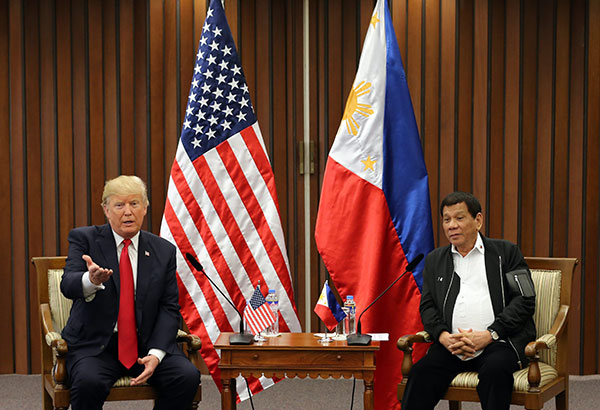Commentary: Duterte admin (finally) acknowledges value of Philippine-US alliance

In late 2016, President Rodrigo Duterte declared his goal to chart an independent foreign policy for the Philippines. He showed his hostility to the country’s long and only treaty ally, the United States, branding it as a colonial and imperial power that has failed its former colony, the Philippines.
He accused the US of providing the Armed Forces of the Philippines with obsolete military equipment and of being an unreliable ally that will never assist the Philippines in an armed conflict even with the 1951 Philippine-US Mutual Defense Treaty (MDT).
Instead of the US, Duterte sought closer diplomatic and economic relations with China. He hoped that closer economic relations between the Philippines and China would foster economic interdependence between the two countries. In turn, this would de-escalate their territorial disputes over the South China Sea.
Less than two years before its term ends in 2022, the Duterte administration is now singing a different tune. Two ranking officials of the Duterte administration publicly acknowledged the importance of the Philippine-US alliance in particular and the presence of American forward-deployed forces in Asia in general.
In late August, Philippine Foreign Affairs Secretary Teodoro Locsin declared, in a television interview, that the Philippines would invoke the MDT if China attacks any Philippine Navy ships in the South China Sea. He also claimed that “it would be in the Philippines’ interests for the US to maintain its military presence in the region,” as he reiterated that the country “never stopped cooperation” with its long-time and only formal treaty ally.
Another ranking Duterte administration official who publicly admitted the importance of the alliance was incoming chairman of the Joint Chief-of-Staff of the AFP, Lieutenant Gen. Gilbert Gape. During his confirmation hearing, he publicly declared the alliance’s value since “the Philippines is still really dependent on the US” to maintain the “bulk of our (the AFP’s) equipment.” Gape admitted that the “Philippine armed forces received roughly US$50million a year for the maintenance of our (the AFP’s) aircraft, naval vessels, and ground equipment like tanks.”
Domestic actors at play
The change in the Duterte administration’s view on the alliance could be attributed to how domestic actors, especially the Philippine military, were able to limit Manila’s pivot to Beijing and maintained the close security relations with Washington. In particular, the AFP has close defense relationship with the US Armed Services.
The 1998 Visiting Forces Agreement facilitates the entry of US troops and their advanced military hardware into the Philippines, where they conduct 300 military exercises with the AFP annually, focusing on humanitarian assistance and risk reduction, counterterrorism, maritime security and civic operations.
From 2016 to 2019, Washington provided Manila with military assistance amounting to US$554 million, including US$267 million in foreign military financing for the acquisition of defense articles.
Since 2016, Duterte has ordered the AFP to develop closer military and defense ties with China’s People’s Liberation Army (PLA) through joint military exercises. The AFP, however, believes that closer ties with the PLA will mean accommodating China’s maritime expansion in the South China Sea and acceptance of Chinese occupation of land features deep inside the Philippines exclusive economic zone.
In several meetings between the two military services, AFP officers were estranged by their PLA counter-parts who are adamant and vocal about China’s undisputable ownership of the South China Sea despite the 2016 United Nations Convention of the Sea (UNCLOS) awards to the Philippines.
This year, the Department of Foreign Affairs filed several diplomatic protests against China with two involving incidents between the AFP and the PLA. One was over an encounter where a Chinese navy corvette pointed its Gun Direction Finder at a Philippine Navy anti-submarine frigate near Rizal Bank. The other one was about alleged harassments of Philippine Air Force reconnaissance aircraft near Scarborough Shoal.
Shifting view on alliance
The two ranking Philippine officials’ statements marked the first time since 2016 that the Duterte administration openly admitted that the country’s defense posture depends on the Philippine-US alliance. This indicates an incremental shift in Philippines policy away from Beijing to one that is more aligned with a specific US policy of challenging expansive Chinese claims in the South China Sea.
Externally, this is a reaction to renewed Chinese aggressiveness in the South China Sea in the light of the COVID-19 pandemic. Domestically, this is because of the current administration’s growing sensitivity to the public’s distrust of China that runs deep, particularly within the Philippine military, whose officers still look at China’s motives and actions within the context of the two countries’ long and tense dispute over the South China Sea.
This commentary is a derivative of a special study entitled, “The Challenge of Managing 21st Century Pandemics amidst the US-China Strategic Competition.” Commissioned by think tank ADR Institute in August 2020, the author emphasized that China’s maneuver to contain the spread in its territory “was not about ensuring health security but primarily as a contest of politics, in which the party-state benchmarks itself against the U.S.” Further, the author also presented a synopsis entitled, “Amidst the US-China Strategic Competition”, in a recently concluded virtual town hall discussion dubbed, “Under Beijing’s Shadow: Southeast Asia’s China Challenge” held Sept. 16, 2020.
- Latest
























